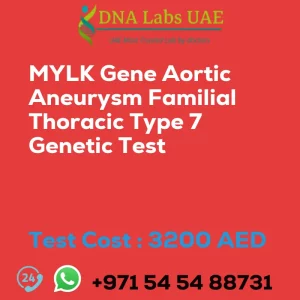ENPP1 Gene Arterial Calcification Type 1 Generalized Infantile Genetic Test
Test Name: ENPP1 Gene Arterial calcification type 1 generalized infantile Genetic Test
Components: Blood or Extracted DNA or One drop Blood on FTA Card
Price: 4400.0 AED
Report Delivery: 3 to 4 Weeks
Method: NGS Technology
Test Type: Vascular Diseases
Doctor: General Physician
Test Department: Genetics
Pre Test Information: Clinical History of Patient who is going for ENPP1 Gene Arterial calcification type 1, generalized, infantile NGS Genetic DNA Test. A Genetic Counselling session to draw a pedigree chart of family members affected with ENPP1 Gene Arterial calcification type 1, generalized, infantile NGS Genetic DNA Test gene ENPP1
Test Details:
The ENPP1 gene is associated with a condition called arterial calcification type 1, generalized, infantile. This condition is characterized by the abnormal accumulation of calcium in the walls of arteries, leading to the narrowing and hardening of the blood vessels. This can result in various health problems, including high blood pressure, heart disease, and stroke.
NGS (Next-Generation Sequencing) genetic testing is a type of genetic testing that allows for the analysis of multiple genes simultaneously. In the case of arterial calcification type 1, generalized, infantile, NGS genetic testing can be used to identify mutations or variations in the ENPP1 gene that may be responsible for the condition.
NGS genetic testing involves sequencing the DNA of an individual to identify any genetic changes that may be present. This can help in the diagnosis of arterial calcification type 1, generalized, infantile and can also provide information about the specific genetic variant involved, which can be useful for genetic counseling and family planning.
It is important to note that NGS genetic testing is a complex and specialized procedure that should be performed by a qualified geneticist or genetic testing laboratory. The results of the test should be interpreted by a healthcare professional with expertise in genetics to ensure accurate diagnosis and appropriate management of the condition.
| Test Name | ENPP1 Gene Arterial calcification type 1 generalized infantile Genetic Test |
|---|---|
| Components | |
| Price | 4400.0 AED |
| Sample Condition | Blood or Extracted DNA or One drop Blood on FTA Card |
| Report Delivery | 3 to 4 Weeks |
| Method | NGS Technology |
| Test type | Vascular Diseases |
| Doctor | General Physician |
| Test Department: | Genetics |
| Pre Test Information | Clinical History of Patient who is going for ENPP1 Gene Arterial calcification type 1, generalized, infantile NGS Genetic DNA Test. A Genetic Counselling session to draw a pedigree chart of family members affected with ENPP1 Gene Arterial calcification type 1, generalized, infantile NGS Genetic DNA Test gene ENPP1 |
| Test Details |
The ENPP1 gene is associated with a condition called arterial calcification type 1, generalized, infantile. This condition is characterized by the abnormal accumulation of calcium in the walls of arteries, leading to the narrowing and hardening of the blood vessels. This can result in various health problems, including high blood pressure, heart disease, and stroke. NGS (Next-Generation Sequencing) genetic testing is a type of genetic testing that allows for the analysis of multiple genes simultaneously. In the case of arterial calcification type 1, generalized, infantile, NGS genetic testing can be used to identify mutations or variations in the ENPP1 gene that may be responsible for the condition. NGS genetic testing involves sequencing the DNA of an individual to identify any genetic changes that may be present. This can help in the diagnosis of arterial calcification type 1, generalized, infantile and can also provide information about the specific genetic variant involved, which can be useful for genetic counseling and family planning. It is important to note that NGS genetic testing is a complex and specialized procedure that should be performed by a qualified geneticist or genetic testing laboratory. The results of the test should be interpreted by a healthcare professional with expertise in genetics to ensure accurate diagnosis and appropriate management of the condition. |








